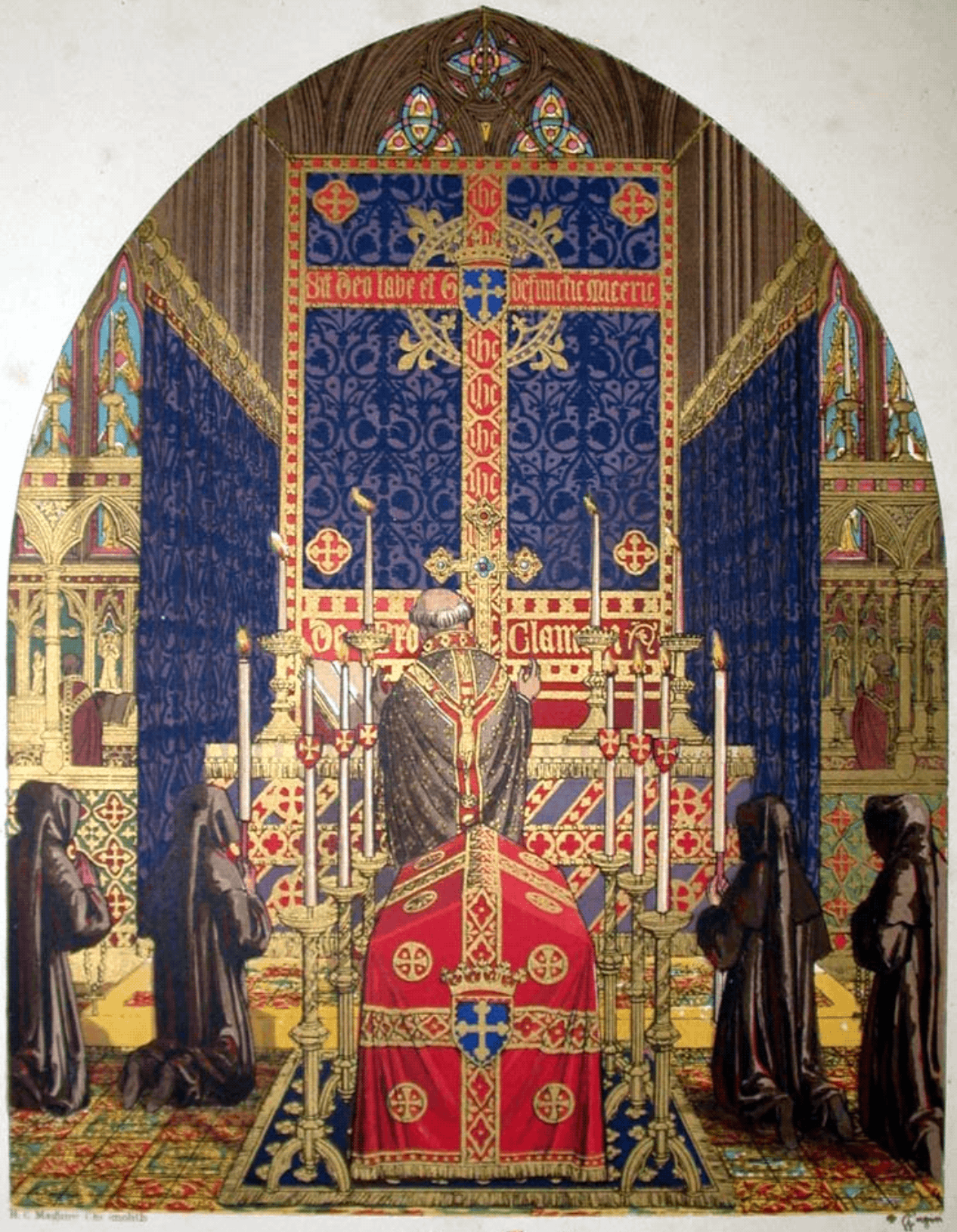“… lacrimosa dies illa,
qua resurget ex favilla
judicandus homo reus —
Huic ergo parce, Deus.
Pie Jesu Domine,
dona eis requiem.”
… that tearful day,
when from the ashes shall rise again
sinful man to be judged.
Therefore pardon him, o God.
Merciful Lord Jesus,
give them rest.
“Amen.”
Amens were echoed around the gathered assembly and into the vaulted ceiling above. Many faces were downcast, more still wet with tears.
Standing alone and apart from the other mourners stood Pierre Levallier, Baron of Neufchâteau. The array of caskets in the center aisle of the church, draped with black cloth palls, hand stitched with rows of white crosses, the crest of the Levallier household, contained the bodies of his family. The first casket held Danielle Martel, Baronne of Neufchâteau, while the other, smaller caskets held the bodies of their three daughters, Cécile, Madeline and Anne-Marie.
The priest continued with the Funeral Mass, but Pierre, lost in his own misery, paid scant attention. His bearded face belied the guilt and grief contained within. Instead of being with his family in their time of need, he had been at war with the forces of his liege lord, Rudolf, the Duke of Lorraine, guarding river crossings across the Somme in Flanders. Though it had pained him to be away from his loved ones, feudal requirements and adherence to the ideals spelled out in the Levallier family motto had kept him away. “Duty, honor and glory”. Mere words, yes, but powerful ones. Powerful enough to pull a man from all that he loves and heartless enough that devotion to such could be rewarded with an empty marriage bed and echoes of his children’s laughter.
The rising summer sun shone in stark contrast to the sombre setting below. As Pierre bent his head back to catch its mocking warmth, a hand on his shoulder brought him out of his reverie. “… in the Year of our Lord one thousand three hundred forty six”, the priest finished.
He realized with a start that the service had moved outside. How long had they been standing there? Feeling everyone’s eyes upon him, he saw that the caskets had been lowered into the ground and that it was time for the final goodbye. Together with Danielle’s parents, the Lord and Lady Martel of Rouen, Pierre brought a handful of earth to each grave and dropped it inside. After everyone’s last respects were paid, the mourners somberly left the grounds of Église Notre Dame and made their way back to Castle Levallier, leaving the undertakers to their work.
The rest of the day was an empty bustle of activity. Food was served, condolences offered and overnight rooms prepared. Pierre did the best he could to attend to the needs of his guests, but Danielle had been the one who ran the domestic affairs of the castle. It was she who through the years had breathed life into these cold, stone walls. As hard as he tried though he needn’t have worried. The servants of the castle, Neufchâteau people every one, performed their duties with the utmost care. Their service throughout the day was a tribute to the life of their lady and her children.
Day finally surrendered to night and the guests made their way to their rooms. When all was quiet, save the background noise of sleep preparations and the final cleaning and fussing of the domestics, Pierre lingered behind in the great room staring at the dying embers in the hearth. Reluctantly, his thoughts returned to his departed wife. Danielle had been known as the Hearthfire of Neufchâteau, and he the Hearth, names bestowed by the townsfolk upon their lieges. These names had been worn proudly by the Levalliers who took great care of their charges. Now, the Hearthfire was dead and the Hearth was empty. What was left now?
When the coals had fully burned themselves out, Pierre made his way to his private chambers. Without any conscious thought, he undressed to his smallclothes, blew out the candle and climbed into the empty bed. There was no comfort to be found here though; the servants had taken care to burn the old bedding and this foreign, barren ticking held a stranger’s scent. Treading quietly to his wife’s armoire, he found one of her folded bedshifts. Returning to bed, he lowered his head onto the pillow and pressed the wife-scented linen against his face. Breathing deeply, for the first time in days, Pierre Levallier, Baron of Neufchâteau, wept, cursing his duty, cursing his honor and cursing his glory.
© 2004, Kenneth F. Guerin
